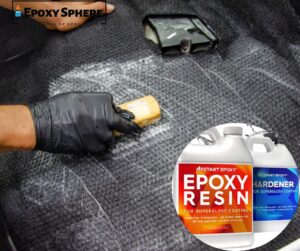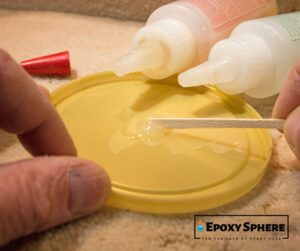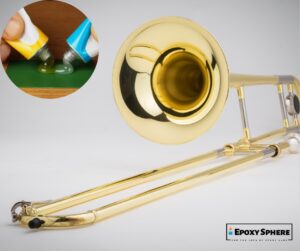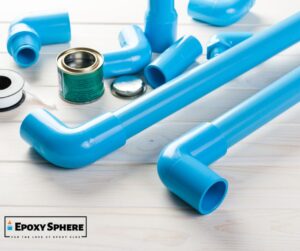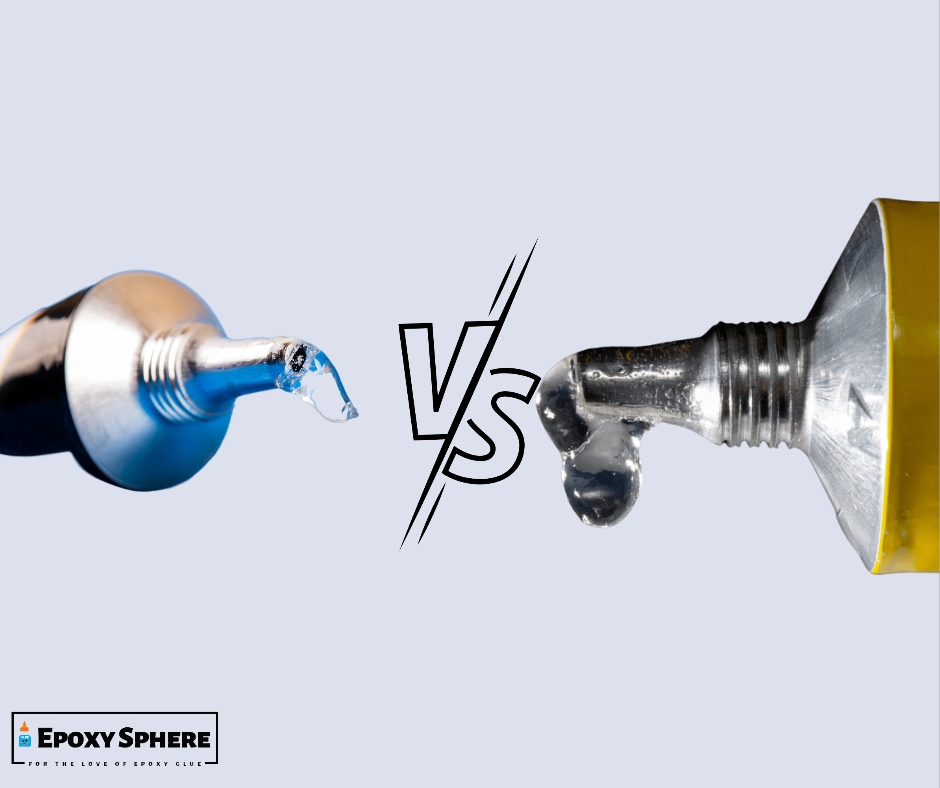
You might wonder which is stronger: “Which Is Stronger Epoxy or Super Glue?”. The truth is, there is no simple answer to this question. It depends on a variety of factors, including the type of material you’re trying to bond and the level of strength you need. Sometimes, epoxy may be a better choice, while in others, superglue might be the better option.
In this article, we’ll inspect the differences between epoxy and superglue, and we’ll help you decide which one is best for your project.
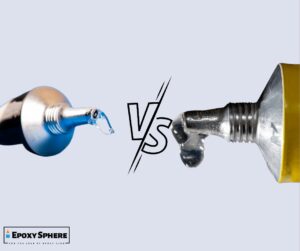
What Is the Difference Between Epoxy and Super Glue?
You might wonder what the difference is between epoxy and superglue. Let’s look at the list below.
- Epoxy is a two-part adhesive that cures when mixed. “Super glue” is a one-part adhesive that cures when exposed to air.
- Epoxy has a much higher bond strength than super glue.
- We can use epoxy on a wider variety of materials than super glue.
- Epoxy is more resistant to heat and chemicals than super glue.
- Epoxy cures more slowly than super glue.
- Super glue is less expensive than epoxy.
- We can use epoxy as a sealant, while super glue cannot.
- Epoxy is more difficult to use than super glue.
What Are the Benefits of Using Epoxy?
When it comes to adhesive strength, epoxy is the clear winner. Here are six reasons you should consider using epoxy:
- Epoxy is incredibly strong and can hold up to 2,000 pounds per square inch.
- It’s waterproof, making it ideal for underwater applications.
- Epoxy is resistant to most chemicals and solvents.
- It has a very long shelf life, making it a great option for long-term projects.
- Epoxy is non-toxic, making it safe for use in a variety of settings.
- Epoxy cures quickly and can be used on a variety of surfaces.
What Are the Benefits of Using Super Glue?
- Super glue is very strong and can bond many types of materials.
- Super glue dries quickly, so you won’t have to wait long for your repairs to set.
- Super glue is resistant to heat and cold, so we can use it in a variety of environments.
- Super glue is non-toxic, so it is safe to use around children and pets.
- Super glue is inexpensive, so it is a great option for budget-conscious consumers.
- Super glue is easy to find, so you should be able to find it at your local hardware store or online.
Which Is Stronger, Epoxy or Super Glue?
So, you want to know which is stronger: epoxy or super glue? Well, let’s take a closer look.
Epoxy is a two-part adhesive that, when mixed, creates a chemical reaction. This reaction causes the epoxy to harden and cure, making it a very strong adhesive. It can be used on a variety of surfaces, including metal, plastic, and wood.
On the other hand, super glue is a one-part adhesive that cures when it comes into contact with moisture. It’s popular because it’s fast-acting and can be used on a variety of surfaces. However, it’s not as strong as epoxy.
So which is stronger? Epoxy is definitely the winner of this battle. It can hold more weight and withstand more pressure than super glue. In fact, I have even known it to hold up under extreme conditions like high temperatures and harsh weather.
In What Situations, Does Epoxy Outperform Super Glue?
There are a few key situations where epoxy is stronger than super glue. Let’s inspect each one.
- First, epoxy is better at bonding surfaces that are irregular or have a lot of pores. While superglue might not form a strong bond in these situations, epoxy will.
- Also, epoxy can withstand more heat and pressure than super glue. So, if you need to bond two surfaces that are under a lot of stress, epoxy is the better option.
- And, epoxy is resistant to most solvents. This means that it’s less likely to dissolve or break down when it comes into contact with other substances.
- Eventually, epoxy is more durable than super glue. It can last for longer periods of time without deteriorating or losing its strength.
In What Situations Is Super Glue Stronger Than Epoxy?
In adhesives, there are a lot of factors to consider: what kind of surface are you bonding with, what is the environment like, and so on. So it’s hard to say unequivocally which is stronger, epoxy or super glue.
But generally, superglue is stronger than epoxy in some situations. Epoxy is better for bonding surfaces that are dirty or greasy, whereas superglue can bond almost anything. Super glue is also more resistant to moisture and temperature changes, making it a better choice for outdoor applications.
But there are some cases where epoxy is the better option. If you’re bonding two surfaces that are both wet, epoxy is going to be more successful than super glue. Epoxy is also better at bonding metal surfaces.
So it really depends on the specific situation, and the materials involved. Though, superglue is the stronger adhesive.
Which Adhesive Should You Use for Your Project?
When it comes to adhesives, there are a lot of options to choose from. So, which one should you use for your project?
Well, if you need a strong adhesive that will hold up under a lot of pressure, then epoxy is your best bet. It’s perfect for bonding metal, wood, and plastic. But keep in mind that epoxy can be tricky to use. It can take a while to dry, and it’s not very forgiving if you make a mistake.
Superglue is a lot easier to use. It dries quickly and is great for bonding smaller pieces of metal or plastic. Plus, it’s relatively inexpensive and can be found at most hardware stores.
So, which adhesive should you use for your project? It really depends on what you’re trying to achieve. But as long as you keep these things in mind, you can’t go wrong with either epoxy or super glue.
How to Use Epoxy
Here’s a step-by-step guide to using epoxy:
- Before you can use epoxy, you need to mix it together. Epoxy comes in two parts: the resin and the hardener. You will usually find these in small bottles that are side by side.
- To mix the epoxy, use a popsicle stick or another mixing tool to transfer an equal amount of each substance into a separate container.
- Once you have mixed the two substances together, use the popsicle stick to apply the epoxy to the surface you wish to repair.
- Be sure to apply the epoxy evenly and smoothly. If you are using epoxy to glue two pieces of material together, press the two pieces firmly together and hold them in place for at least 5 minutes.
- Afterward, the epoxy should be dry, and your repair will be complete!
How to Use Super Glue
We can use super glue for many things, like fixing broken things or sticking things together.
Here’s a step-by-step guide to using Super Glue:
- Start by cleaning the surfaces that you want to glue together. This will ensure that the glue adheres properly.
- Apply a small amount of Super Glue to one surface.
- Press the two surfaces together and hold them for a few seconds.
- Allow the glued area to dry for 24 hours before using or handling.
Keep in mind that Super Glue is a strong adhesive, so we do not recommend it for use on delicate or fragile objects.
It is also important to be careful when using Super Glue, as it can cause skin irritation. If you do get Super Glue on your skin, you can remove it with nail polish remover or acetone.
Conclusion
When it comes to choosing the strongest adhesive, epoxy is the clear winner. However, superglue still has its advantages. It’s faster in drying and easier to use in smaller quantities.
So, which should you choose for your next DIY project? Epoxy is a little more difficult to work with, but it’s much stronger than super glue. If time isn’t a factor and you’re looking for a long-lasting bond, epoxy is the better option. If you need a quick fix that will hold up under light stress, super glue is the way to go.

Hi, This is John Davis. After years of working in the construction industry, I decided to create a website that would provide people with information about glue and its exceptional uses. I hope You find it useful


